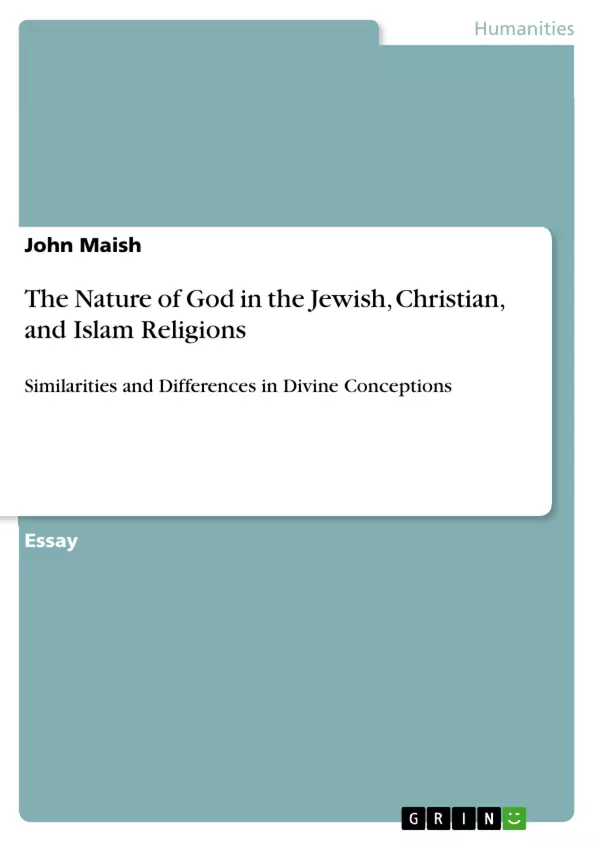Throughout the history of humanity, religion has remained a controversial and tremendously delicate subject that demands considerable caution. A slight misunderstanding from this trajectory can lead to spiteful destruction, including death and injuries. Notably, the most fundamental element that triggers controversies is the concept of a superior being in which a particular religious group believes.
Table of Contents
- The Nature of God in the Jewish, Christian, and Islam Religions
- The Abrahamic God
- Judaism: The Oldest Abrahamic Religion
- Christianity: Rooted in Judaism
- Islam: The Last to be Formed
- Similarities and Differences in the Concept of God
- The Revelation of God
- Differences in the Concept of God
Objectives and Key Themes
This text aims to explore the concept of God in Judaism, Christianity, and Islam. The text delves into the origins and development of these religions, examining their shared roots in the Abrahamic tradition and highlighting the unique perspectives they offer on the divine.
- The Abrahamic Tradition
- The Concept of God in Judaism, Christianity, and Islam
- Similarities and Differences in Religious Beliefs
- The Role of Prophets and Revelations
- The Nature and Purpose of the Universe and Human Life
Chapter Summaries
- The Nature of God in the Jewish, Christian, and Islam Religions: This chapter introduces the concept of God in the Abrahamic religions, outlining their shared roots and highlighting the distinct interpretations of the divine.
- The Abrahamic God: This section delves into the common threads that connect Judaism, Christianity, and Islam, particularly the shared belief in a single, powerful God who is eternal, omniscient, omnipotent, and the creator of the universe.
- Judaism: The Oldest Abrahamic Religion: This chapter explores the origins and unique aspects of Judaism, emphasizing its monotheistic nature and reverence for Yahweh. It discusses key Jewish texts, including the Torah and Talmud, and explores the concept of the Messiah.
- Christianity: Rooted in Judaism: This section examines Christianity's roots in Judaism, outlining the shared scriptures and the central role of Jesus Christ as the Messiah and savior. It explores the concept of the Trinity and the development of the early Christian church.
- Islam: The Last to be Formed: This chapter delves into the origins and unique aspects of Islam, discussing the Quran as the central scripture and highlighting the role of Muhammad as the final prophet. It explores Islam's connection to the preceding religions and its emphasis on submission to God.
- Similarities and Differences in the Concept of God: This chapter highlights the similarities and differences between the three Abrahamic religions regarding the concept of God, focusing on the unique interpretations of God's nature, attributes, and interactions with humanity.
- The Revelation of God: This section examines the concept of revelation in the Abrahamic religions, discussing how God communicates with humanity through various prophets and scriptures. It highlights the shared understanding of the purpose of revelation, which includes revealing God's nature, the nature of the universe, and the purpose of human life.
Keywords
The central keywords of this text include Abrahamic religions, Judaism, Christianity, Islam, monotheism, God, Yahweh, Jesus Christ, Muhammad, prophets, revelation, scriptures, Torah, Talmud, Bible, Quran, Messiah, Trinity, divine communication, and the nature of the universe and human life.
Frequently Asked Questions
What are the shared roots of Judaism, Christianity, and Islam?
All three are Abrahamic religions, meaning they share a common tradition rooted in the belief in one God (monotheism) and trace their spiritual lineage back to the patriarch Abraham.
How does Judaism view the nature of God?
Judaism, the oldest Abrahamic religion, emphasizes the absolute oneness of Yahweh, who is eternal, omnipotent, and has a unique covenant with the Jewish people.
What is the Christian concept of the Trinity?
While monotheistic, Christianity believes in one God existing in three persons: the Father, the Son (Jesus Christ), and the Holy Spirit.
How does Islam define the role of Muhammad?
Islam views Muhammad as the final prophet in a long line that includes figures from Judaism and Christianity, sent to deliver the ultimate revelation, the Quran.
What is the common understanding of 'Revelation' among these religions?
All three believe that God communicates His nature, laws, and the purpose of human life to humanity through chosen prophets and sacred scriptures.
- Quote paper
- John Maish (Author), 2022, The Nature of God in the Jewish, Christian, and Islam Religions, Munich, GRIN Verlag, https://www.grin.com/document/1388964



